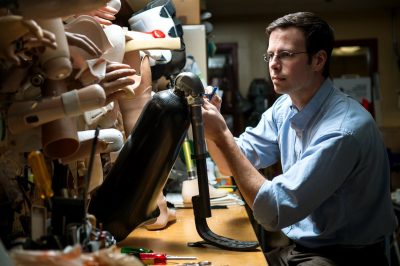Jon Sensinger Turns His Childhood Dream into Reality
Author: Engineering Alumni Office
Posted on Jul 23, 2017
Category: Research Spotlight

For Jon Sensinger, associate director of UNB's Institute of Biomedical Engineering, a childhood dream has turned into an innovative career – one that is changing lives. “I'm always telling people that I love every aspect of my job,” says Sensinger. “Whether it's helping other staff in a managerial sense or teaching students and learning myself through the process, or whether it's interacting with patients or designing things. “I think my only regret is that all those activities are so much fun and it's hard to fit them all in.”
A pioneer in the field of biomedical engineering, Sensinger was named 2016 Young Health Researcher of the Year by the New Brunswick Health Research Foundation. His research focuses on understanding how the human brain can work in tandem with the control interfaces created to operate a prosthesis – in other words, finding ways to develop thought-controlled bionic limbs.
“You know the media is always talking about how good prostheses are and relative to airplanes and cars it is phenomenal technology, but relative to the human body we still have such a long way to go and so part of me looks at the gap or the need there and is motivated by that,” he says. While children and adults often explore many career paths before finding their calling, Sensinger knew at three years old that he was meant to innovate, design and build.
In elementary school, seeing friends and classmates struggle with physical disabilities, he was inspired to find a way to help. While working on a career project in seventh grade, his teacher told him about the field of prosthetics. With encouragement from engineers at a local prosthesis shop, he began to pursue a bachelor's degree in biomedical engineering, and then a PhD. He knew that he wanted to do research in prosthetics, but struggled to find a dean who would consider allowing a first-year student to take on his own research. At the University of Illinois in Chicago, after it seemed like another door had closed, an administrative assistant told him about a professor who might be willing to take him on. That professor was Farid Amirouche and he mentored Sensinger throughout his undergraduate degree, providing him with a strong foundation of research experience.
“So, I did my undergrad, master's and PhD in biomedical engineering and was exposed to UNB during that time because UNB is probably one of the three to four world leaders in prosthetics – and has been since its inception.”
“The whole international community convenes here at UNB every three years and so I, along with everyone else, came here around 2005. I was really impressed by the research that was done here, and also impressed by the researchers themselves who were, you know, world-renowned researchers, and also really personable and friendly.” After earning his PhD, Sensinger worked as a professor in Thailand and was director of the Prosthesis Design and Control Laboratory at the Rehabilitation Institute of Chicago before being recruited by Kevin Englehart (BScEng'89, MScEng'92, PhD'99), director of UNB's Institute of Biomedical Engineering. “Jon has been a tremendous presence at the Institute of Biomedical Engineering here at UNB since arriving in the fall of 2013,” says Englehart. “The standards he sets in terms of the quality of his work has been an inspiration to his students and colleagues. He collaborates easily with colleagues at UNB and around the world, which has broadened the scope of activities at our institute leading to research in exciting new directions.”
A music enthusiast and outdoorsman, Sensinger plays the cello for his church and is a leader with Scouts Canada. In his spare time, he enjoys both playing and building instruments. His approach to instrument making is akin to that of engineering, “I like to be guided by a set of principles or equations, but I also like to be guided by experiments.”
When asked about the best part of his job, Sensinger says, “I really think it's a combined package and I think that's true for biomedical engineering in general. It tends to be a jack of all trades field where you've got to not necessarily have expertise in any one area, but you need to know a variety of areas” – a philosophy that seems to apply to all areas of his life.
Originally published in the Alumni News magazine, Spring 2017
